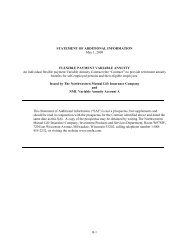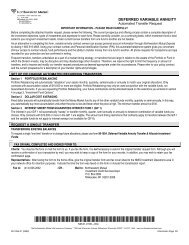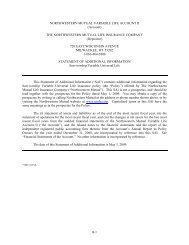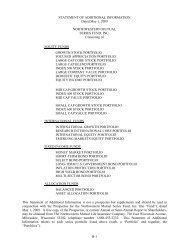B-1 STATEMENT OF ADDITIONAL INFORMATION Dated May 1 ...
B-1 STATEMENT OF ADDITIONAL INFORMATION Dated May 1 ...
B-1 STATEMENT OF ADDITIONAL INFORMATION Dated May 1 ...
You also want an ePaper? Increase the reach of your titles
YUMPU automatically turns print PDFs into web optimized ePapers that Google loves.
manager(s) are responsible for making the final voting decision based on their review of the agenda,RiskMetrics and/or Glass Lewis analyses, their knowledge of the company and any other informationreadily available. In situations where the Investment Manager has not responded with voterecommendations to the Proxy Group by the deadline date, the Proxy Group may defer to the voterecommendations of an independent third party provider of proxy services. Except in cases where theProxy Group is deferring to the voting recommendation of an independent third party service provider,the Proxy Group must obtain voting instructions from Investment Manager's research analyst, relevantportfolio manager(s), legal counsel and/or the Advisory Client or Proxy Review Committee prior tosubmitting the vote. In the event that an account holds a security that the Investment Manager did notpurchase on its behalf, and the Investment Manager does not normally consider the security as a potentialinvestment for other accounts, the Proxy Group may defer to the voting recommendations of anindependent third party service provider.GENERAL PROXY VOTING GUIDELINESInvestment Manager has adopted general guidelines for voting proxies as summarized below. In keepingwith its fiduciary obligations to its Advisory Clients, Investment Manager reviews all proposals, eventhose that may be considered to be routine matters. Although these guidelines are to be followed as ageneral policy, in all cases each proxy and proposal will be considered based on the relevant facts andcircumstances. Investment Manager may deviate from the general policies and procedures when itdetermines that the particular facts and circumstances warrant such deviation to protect the interests of theAdvisory Clients. These guidelines cannot provide an exhaustive list of all the issues that may arise norcan Investment Manager anticipate all future situations. Corporate governance issues are diverse andcontinually evolving and Investment Manager devotes significant time and resources to monitor thesechanges.INVESTMENT MANAGER’S PROXY VOTING POLICIES AND PRINCIPLESInvestment Manager's proxy voting positions have been developed based on years of experience withproxy voting and corporate governance issues. These principles have been reviewed by various membersof Investment Manager's organization, including portfolio management, legal counsel, and InvestmentManager's officers. The Board of Directors of Franklin Templeton’s U.S.-registered mutual funds willapprove the proxy voting policies and procedures annually.The following guidelines reflect what Investment Manager believes to be good corporate governance andbehavior:Board of Directors: The election of directors and an independent board are key to good corporategovernance. Directors are expected to be competent individuals and they should be accountable andresponsive to shareholders. Investment Manager supports an independent board of directors, and prefersthat key committees such as audit, nominating, and compensation committees be comprised ofindependent directors. Investment Manager will generally vote against management efforts to classify aboard and will generally support proposals to declassify the board of directors. Investment Manager willconsider withholding votes from directors who have attended less than 75% of meetings without a validreason. While generally in favor of separating Chairman and CEO positions, Investment Manager willreview this issue on a case-by-case basis taking into consideration other factors including the company'scorporate governance guidelines and performance. Investment Manager evaluates proposals to restore orprovide for cumulative voting on a case-by-case basis and considers such factors as corporate governanceprovisions as well as relative performance. The Investment Manager generally will support non-bindingshareholder proposals to require a majority vote standard for the election of directors; however, if theseproposals are binding, the Investment Manager will give careful review on a case-by-case basis of thepotential ramifications of such implementation.Ratification of Auditors: Investment Manager will closely scrutinize the role and performance ofauditors. On a case-by-case basis, Investment Manager will examine proposals relating to non-auditB-118
















